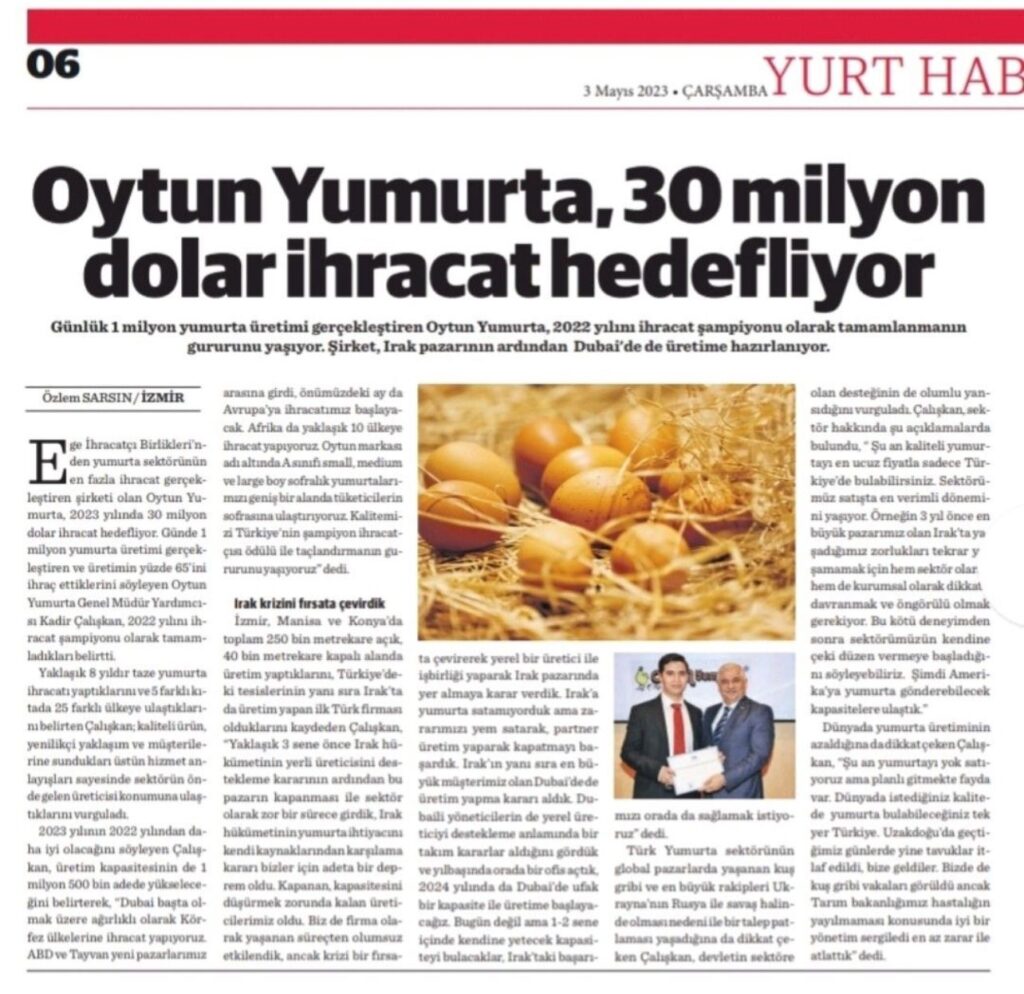Oytun Yumurta, which produces 1 million eggs daily, is proud to complete 2022 as the export champion. After the Iraqi market, the company is also preparing for production in Dubai.
Oytun Yumurta, the company with the highest exports in the egg sector from the Aegean Exporters’ Association, aims to export 30 million dollars in 2023. Oytun Yumurta Deputy General Manager Kadir Çalışkan, who said that they produce 1 million eggs per day and export 65 percent of the production, stated that they completed 2022 as the export champion.
Stating that they have been exporting fresh eggs for approximately 8 years and have reached 25 different countries in 5 different continents, Çalışkan emphasized that they have become the leading producer in the sector thanks to their quality products, innovative approach and superior service understanding they offer to their customers.
Stating that 2023 will be better than 2022, Çalışkan stated that the production capacity will increase to 1 million 500 thousand units and said, “We export mainly to the Gulf countries, especially Dubai. The USA and Taiwan have become our new markets, and our exports to Europe will begin next month.
We export to approximately 10 countries in Africa. Under the Oytun brand, we deliver our Class A small, medium and large table eggs to consumers’ tables in a wide area. We are proud to crown our quality with the Türkiye’s champion exporter award,” he said.
We turned the Iraq crisis into an opportunity
Noting that they produce in a total of 250 thousand square meters of open and 40 thousand square meters of closed area in Izmir, Manisa and Konya, and that they are the first Turkish company to produce in Iraq in addition to their facilities in Türkiye, Çalışkan said, “We entered a difficult period as a sector with the closure of this market after the Iraqi government’s decision to support its domestic producers approximately 3 years ago. The Iraqi government’s decision to meet its egg needs from its own resources was like an earthquake for us. We had producers who closed down and had to reduce their capacity.
We, as a company, were also negatively affected by the process, but we decided to turn the crisis into an opportunity and enter the Iraqi market by cooperating with a local producer. We could not sell eggs to Iraq, but we managed to cover our losses by selling feed and doing partner production. In addition to Iraq, we decided to produce in Dubai, our biggest customer.
We have seen that Dubai managers have made some decisions to support local producers and we opened an office there at the beginning of the year, and we will start production in Dubai with a small capacity in 2024. Not today, but in 1-2 years, they will find the capacity they need, we want to achieve our success there as well, as we did in Iraq,” he said.
Çalışkan also drew attention to the fact that the Turkish egg sector experienced a demand boom due to the bird flu in global markets and the war between Ukraine and Russia, their biggest competitor, and emphasized that the state’s support for the sector was also reflected positively. Çalışkan made the following statements about the sector, “You can currently find quality eggs at the cheapest price only in Türkiye. Our sector is experiencing its most productive period in sales.
For example, in order not to experience the difficulties we experienced in Iraq, our largest market, 3 years ago, we need to be careful and foresighted both as a sector and as an institution. We can say that our sector has started to pull itself together after this bad experience. Now we have reached the capacity to send eggs to America.” Çalışkan, who also drew attention to the fact that egg production in the world has decreased, said, “We are currently selling eggs like hotcakes, but it would be beneficial to proceed with a plan.
“The only place in the world where you can find eggs of the quality you want is Turkey. In the Far East, chickens were culled again in recent days and came to us. We also had bird flu cases, but our Ministry of Agriculture showed good management in preventing the spread of the disease and we got through it with minimal damage,” he said.

